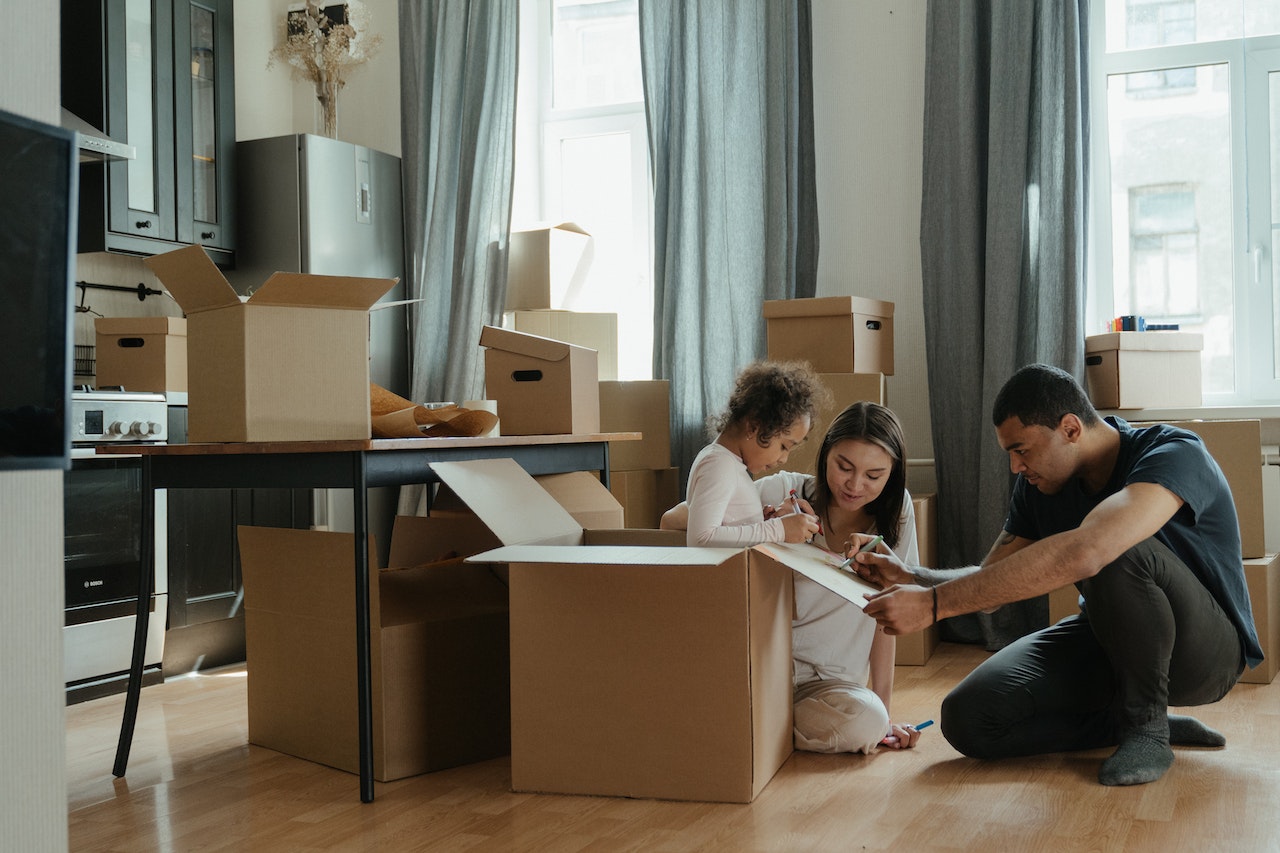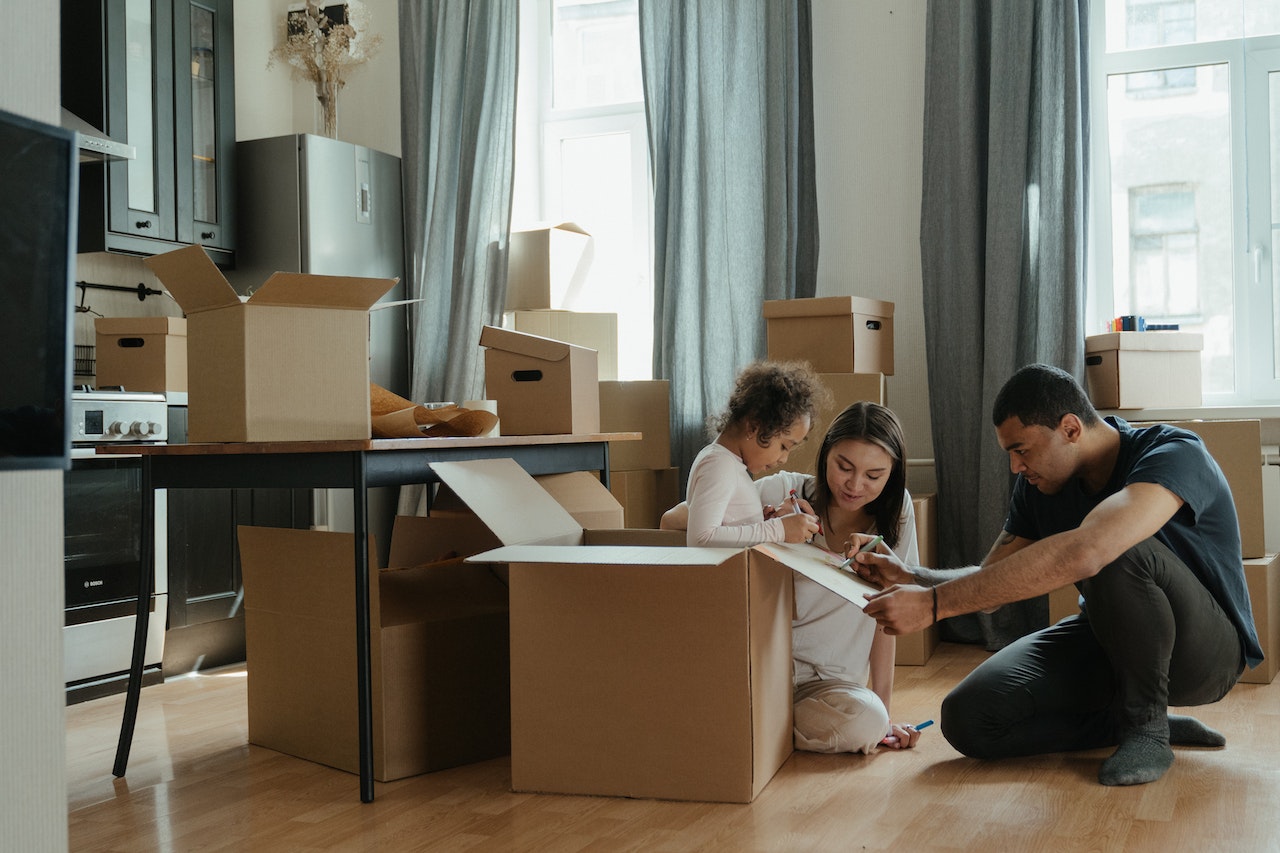It should be exciting to move to a new house. But moving is without a doubt a stressful and difficult experience, no matter how exciting your future may be. It takes a lot of time and effort, and it’s normal to feel worried when faced with new environments, cultures, or jobs. The cost of hiring movers, making security deposits, and driving or flying to your new location all add to the financial strain. Apparently, it’s one of the most stressful events in life, along with divorce and the death of a loved one.
Feeling overwhelmed by the process is one of the primary causes of moving-related stress in people. You can minimize this by creating a plan and taking action before your move.
- Make sure you take care of the utilities, such as your internet provider, of your new home a month before you move in by transferring them to your new home, or if they’re not available in your area, terminate your service and shop around for new options.
- Don’t wait to hire movers. Book them at least two weeks in advance. Waiting until the last minute can result in a higher price point and not hiring the right service that fits all your needs. Whether you’re moving locally or moving to the Big Apple, hiring movers early on is the best option to beat unnecessary stress and watch your budget.
- Clean items while you pack them. This will significantly reduce the time it takes you to unpack and get set up in your new home.
- Pack an overnight bag. It can be extremely stressful to move into your new house and realize you have no idea where you packed your essentials. Make sure you have a change of clothes, pj’s, toiletries, medications, and anything else you might need before you unpack everything.
There’s no surefire way to avoid stress on moving day. And while some stress is just excitement disguised as nervousness, it can feel like it’s getting out of control. However, things don’t have to be that way. Stress-related to moving can be reduced.
Additionally, understanding your new surroundings can provide peace of mind. For instance, if you’re moving to a different country, such as Canada, familiarizing yourself with the list of Canadian provinces by rank, from largest to smallest population, can help you feel more connected to your new location. This preparation not only streamlines the moving process but also empowers you to embrace the change ahead with confidence. Please continue reading to discover how our experts give great advice on how to have a stress-free moving experience.
When it comes to relocating your office, there are essential rules to follow when moving office that can make all the difference. From creating a detailed timeline and checklist to communicating effectively with your team about the transition, adhering to these guidelines ensures that every aspect of the move is well-organized and efficient.
Before the move
What are some of the most common mistakes when planning a move? How can we avoid them?
There are a few things to keep in mind when planning a move to go as smoothly as possible.
A basic mistake you should avoid is a lack of planning. It’s really important to give yourself the time (and enough time) to plan the move. Not planning leads to another mistake: not knowing what to expect and poor organization. If you don’t allow enough time for planning and packing, making a list of tasks or priorities, or labeling boxes with their contents and the destination room they belong in at your new place, these can make your move more stressful than it needs to be.
Packing is a vital part of moving, yet it’s one of the most commonly overlooked aspects. People often don’t start packing early enough, pack too much stuff, pack fragile items without proper protection, or simply don’t get enough boxes. Packing too late leaves you rushed and stressed and more likely to make careless mistakes. Packing too much is another common mistake. You may think you need everything you own, but chances are you won’t use most of it in your new home. Be selective about what you pack, and only bring what you really need.
Then, when you look for a moving company, common mistakes include not doing enough research, not getting an estimate, and not reading the fine print in the contract. You want to make sure you are hiring a reputable company that will take care of your belongings. So make sure to read online reviews and get recommendations and advice from friends or family who have used a moving company. Not getting an estimate is a mistake because you need to know how much the move will cost with every considered moving service provider so you can budget accordingly well in advance. Be sure to get an estimate from each company you are considering and compare the prices before making a decision. Then read the contracts carefully because hidden fees or other important information could help you rule out one or more moving companies and spare some headaches.
When it comes to Moving Day, most people will confirm this is one of the most stressful days of a person’s life. There are so many things to think about and supervise, and it’s easy to make a mistake, such as leaving things behind or last-minute careless packing.
Planning everything ahead, from researching and budgeting to packing and actual moving, while giving yourself enough time for each step will minimize the risks and save you a lot of time and money in the process.
– Daisy Linden at DaisyLinden.com
What can we do to prevent a stressful moving experience?
Before we became GypsyNesters (as in empty-nest gypsys), we moved several times and each time always said it would be the last. It takes a toll, especially when going overseas (which we did twice, to St. Croix and then back again years later).
I think the biggest thing we learned through all of the moves was to be able to get rid of stuff. There was a ton of junk we didn’t really need, and if we threw it away, sold it, or donated it, then we didn’t have to move it.
By the time we moved down to the Caribbean, we had reduced our stuff down to one shipping crate, and by the time we moved back up to the states, we managed to carry everything with us on the plane except for sixteen boxes that we shipped.
It was hard to do at first. We agonized over every little knick-knack, photo, and document during our first big move. And let me tell you, with three kids and living in a house for a dozen years, there was plenty to pour over.
But as time went on, we developed a very keen sense of what was truly important and needed to be saved.
And remember, if you don’t keep it, you don’t have to move it!
– David & Veronica at The GypsyNesters
How can people make the decluttering process more efficient before moving?
To make the decluttering process more efficient before you move, start by creating a plan and setting a realistic timeline for the task. Next, sort your belongings into categories, such as keep, donate, sell, or discard. Be ruthless in your decision-making and avoid holding onto items out of guilt or sentimentality. Consider hiring a professional organizer or enlisting the help of friends and family to speed up the process. Finally, dispose of unwanted items responsibly, either by donating them to a local charity, selling them online or at a yard sale, or recycling or disposing of them properly.
What is the best way to start organizing and packing before a move?
- Start by sorting your belongings into categories, such as clothing, furniture, kitchen items, etc.
- Then break down each category into smaller groups. For example, with clothing, you might sort by types of clothing, such as shirts, pants, and dresses.
- Once you have everything sorted, start packing your belongings using boxes or storage bins.
- Label each box or bin containing the contents and the room in your new home.
- Make sure to pack an essentials box that includes items you’ll need right away, such as toiletries, a change of clothes, and bedding.
- Pack seasonal items together, so you don’t feel pressure to unpack that box first if you don’t need it.
– Michelle Hansen, Professional Organizer at Practical Perfection
When you are planning a move, you should first plan out the layout of your next home. That way, when you are packing, you can determine what room everything belongs in beforehand. For example, you can have a guest bedroom box and have it moved to the guest bedroom. Avoid packing items from multiple rooms into the same box. Even if one box is half full and the other is overflowing, keep the rooms separate and start an entirely new box. This will make moving and unpacking easier.
– Josh Matteson, Director of Marketing at Lula.life
What are your top tips for decluttering or purging before your move?
One of the most difficult parts of moving is decluttering before you move into your new house. That’s why so many skip this step and decide they’ll “purge once they move in.” This is a big mistake.
Just think of all of the time, energy, and money you’ll save if you don’t have to move as much stuff. Think about how easy it will be to unpack in your new home if everything you’re taking out of those boxes are things you love, need, and use. Doing this will make the moving process much easier and allow you to enjoy your new home much quicker. Not to mention, fewer boxes mean saving money on the move!
Decide whether you need or like each item before you move. Don’t wait to see if it’ll fit in the new space. Do you want your dream home to feel cluttered and messy? I’m guessing you don’t. So why bring any clutter into it? Take the time now to purge anything and everything you don’t use, need, want, or love.
As you purge, keep these tips in mind:
1. The money is already spent. If you don’t use the item, it’s taking up valuable space and time from you. Get rid of it. Don’t keep it just because you spent money on it.
2. The gift was in the giving. If someone gifted you something you don’t want or need, don’t keep it out of guilt. That guilt weighs you down. Purge it and remember that the person who gave you that gift wouldn’t want you to feel only guilt whenever you see it.
3. You won’t regret getting rid of it. The lightness you’ll feel by having a home with only the items you truly love and use will far outweigh any small regrets over something you might have wished you had kept.
4. If everything is precious, then nothing is precious. Keep only the sentimental items that are truly special to you.
– Corinne Morahan, CEO of Grid + Glam
What is the best way to label boxes before you move?
I have moved over 20 times in recent years, and just a small percentage was when I was living as a digital nomad. In fact, I decided to become a digital nomad because I was moving so much. I’m glad it brought me all the moving experiences a person would need because I have a good way of labeling boxes!
The best way to label boxes before you move is by creating a spreadsheet system. Give all the boxes a number, and list in the spreadsheet what’s in them. This way, you don’t have to unpack immediately, but it keeps things organized. I’ve done this in my last five moves (hello city life!), and it’s a wonderful, self-designed system. You should still add the rooms on each box to help the movers, but that won’t help you. So keeping a list of everything that’s in one box will help you unpack the boxes that are most important first.
If you want to take this to the next level, you can even add a number system in place, like everything that starts with ‘1’ (-so 1, 11, 12, 13, etc.) should be unboxed immediately but everything that starts with ‘2’ can wait. Good luck with moving!
– Maria at Noni May
What are the top 10 tips to reduce stress before a move?
1. Declutter: The first thing you should do is declutter. It’s essential to get rid of items you no longer use or need to help make packing easier.
2. Use Tarps: You can use tarps to cover your boxes, furniture, and items. Not only can they help protect your items from rain or the sun, but they also make it easier for you to move things around in your house.
3. Plan Ahead: Make sure you have everything you need to get started. You’ll want to have boxes, packing tape, markers, and containers on hand before you begin packing. If possible, try to pack your items in advance so they’ll be ready to go when the time comes.
4. Use Plenty of Packing Material: It’s best not to skimp on packing material because it will help protect your fragile and valuable items from damage during the move.
5. Make a Packing List: It’s always good to have a packing list of everything you want to pack, especially if you’re moving far away. This will ensure that you don’t leave anything behind and that everything is organized accordingly.
6. Use Boxes With Dividers: It would help if you always used boxes with dividers to protect your belongings from damage and breakage during transit. Also, the boxes should have enough space and depth to easily fit everything inside them without getting squeezed or bent out of shape.
7. Use Packing Cubes: Packing cubes are great for filling up small items that are hard to wrap in newspaper or bubble wrap because they don’t leave any space between the object and the container it’s packed in; this prevents damage during transit because there won’t be any air pockets that could collapse when the box is moved.
8. Stack Boxes: Stack your boxes neatly to make them easy to carry and load into the truck or van. This will also keep them from falling over if they aren’t appropriately stacked, which is important when packing heavy items such as books, appliances, or furniture.
9. Label Everything: Labeling is essential, especially if you have many boxes. You want to label the box with its contents to know what’s inside each box.
10. Explore Your New Place: It would help if you first explored your new place before packing. This will help you see what items you need or don’t need.
– Gabby Day, Moving Specialist at All Around Moving Services Company, Inc.
How can you reduce feeling overwhelmed before moving to a new house?
Competition for the best houses can be stressful. Not only are you competing against other homebuyers, but you’re competing against corporate investors with deep pockets as well. However, you can level the playing field by becoming a cash buyer yourself. It’s an option for homebuyers everywhere, thanks to programs like Buyer Accepted from New American Funding.
Why Become a Cash Buyer?
Cash buyers are four times more likely to win in a bidding war than those using traditional sources. That’s because paying with cash is instant – and guaranteed. In fact, sellers are so eager to work with cash buyers that studies show cash buyers will pay about 11% less for their homes than those paying with a traditional mortgage.
The Buyer Accepted program from New American Funding works with hopeful homebuyers so they can make a cash offer for their houses, then pay the money back once they’ve secured their financing. There is only the cost of the house plus a convenience fee (which can be added to the total loan amount) for using this service. This is also a great way for buyers that are selling their previous house to fund their new home purchase. With this program, buyers aren’t required to sell their previous houses before they’re able to move into their new homes. This offers flexibility and helps reduce any feelings of being overwhelmed. Learn more about becoming a cash buyer here.
– Joel Kennedy, Content Marketing Director at NewAmericanFunding.com
How can you ship your car when moving?
So, you don’t or can’t drive to your new home. How do you get your car there? There are several ways to move your car when you relocate. Nationwide auto transportation companies ship cars across the country, state to state, to your door. When you need to move a car, simply request a free online car shipping quote, compare services and customer reviews, and select the company that meets your needs.
TIP: Start your research of auto shipping companies at least 2 weeks before you want to ship it to ensure you get the best possible deal.
– David Smith at Nationwide Auto Transportation
During the move
How should we prepare for the actual moving day?
Clear Out the Old
Now is the time to De-Clutter. Do you really want to put in the effort and cost of moving dozens of boxes of clothes, kids’ old toys, household/ kitchen goods, or excess books not used in years?
Be ruthless with your decisions to let go of things. Sell, give away, call donation centers to pick up items, and keep up the momentum of getting the excess out of your place before you start the packing.
If you have time, start posting and selling or giving for free on all the available sites. Price the items at a reasonable rate, so they sell quickly. If you are meeting somewhere, bring a few other things along that they may be interested in. Often the buyer just may realize they can use those items.
Gather Up the Boxes and Packing Material
Now that you’re down to the essence of what is going to the new location, start sizing up what type of boxes are needed. With all the consumer shopping and shipping these days, there may be no shortage of boxes and packing material right in your own garage.
Don’t be surprised if you don’t have enough. Start watching for listings of free boxes on neighborhood sites from people who may have just unpacked after a move near you. Some rental truck stores carry extra used boxes in their back room as a recycling service. Ask around.
Use your linens, towels, and socks to pack fragile items for extra packing material and creative ways to move your stuff.
Pay Attention to Your Routines for a Stress-free Arrival
Pay attention to your morning bathroom routine, toiletries, meals, medications, grooming supplies, keys, glasses, clothes, tools, devices, and electronics you use throughout the day. What are you taking for granted that is always right there? Place all those items in a separate container that stays with you during the move and is available at all times. Be sure to include all those charging cables.
The best way to stay stress-free in a move is to have all those little items handy immediately when you make it to your new place. This extra planning will streamline your adjustment for your first evening and start your new day. It’s amazing how many little things you need on those first days: tools, kitchen utensils, bottle openers, medications, charging cables, and so much more.
– Judy Lawrence MS Ed, Money Coach ~ Financial Counselor at MoneyTracker.com
Moving can be daunting, but it can be a lot easier with a bit of preparation. Here are some tips for moving day:
1. Make a plan. Before you start packing, create a list of what you need and where it is going. This will help you load faster and keep track of what is in your truck.
2. Get organized. When unpacking everything, make sure to put everything in its proper place. This will save time and energy when trying to find something later.
3. Minimize the damage. During the move, try to avoid damaging furniture or other belongings. This will save you money and hassle down the road.
4. Stay positive. Moving is complicated, but it can be done with patience and perseverance. Don’t get too stressed out. Remember that everything will eventually be unpacked and back together again!
– Ganga Relocation at GangaRelocation.com
What are the benefits of using a storage unit while moving?
Moving, no matter the reason, can be difficult on its own and stressful for everyone. You may find that using a self-storage unit while moving can offer some great benefits. Some of these solutions offered here will be beneficial whether you’re selling and buying, downsizing, or just organizing what you have already packed.
Renting a short-term storage space does cost additional money. However, the rewards you will reap will out way the costs. For instance, if you are selling your current home, de-clutter by packing away your personal things. Many real estate professionals say to remove personal items such as pictures and memorabilia so potential buyers can visualize themselves in your home. Make closets and cabinets look bigger by having less stuff in them. So, get a head start packing seasonal items you don’t use very often. Don’t store the packed boxes in closets or your garage. Store them in a self-storage unit where they will be ready for when you move into your new home.
Purchasing a new home can be exciting, but it can also take a while. Regardless of the real estate market, it can still take 30-60 days to close on a home. Sometimes these timelines aren’t convenient for a smooth transition. If you can’t stay longer where you are, and you need to move out, a storage unit can be an affordable month-to-month solution to store your stuff. That way, you can stay with family and friends until closing day.
Maybe you are moving to a new place that is smaller than your current home. How to decide what furniture you want to keep? Not sure what furniture will fit? What to do with your seasonal décor or sports gear? Moving is already stressful as it is, don’t make rash decisions on what you want to keep. A self-storage unit near you can store those things until you are ready to decide what you really want to keep. Need to sell some furniture, do it straight from your storage unit. Need to keep storing seasonal décor or sports gear? A storage unit close to home offers a convenient option.
No matter why you have decided to move, once you start packing, you will have many boxes in your home or apartment. Living even for a short time with all those boxes can be frustrating and inconvenient. Temporarily storing packed boxes in a small storage unit until you move can help keep you organized and sane.
Make your move as stress-free as possible by using a self-storage unit. The benefits you receive will be priceless as you transition to your new place.
– Lee Preston, Director of Marketing at EZstorit.com
What should I pack for my first night in my new house?
The last thing anyone wants to do after a long moving day is to open box after box in search of your PJs, toothbrush, pillow, and your kid’s night light. No one wants to go on a treasure hunt at the end of moving day!
Here’s how to have a restful first night:
Pack a suitcase for each family member (two and four-legged) for their first night. Bring those suitcases with you, so you’ll know right where they are.
Each suitcase should be packed with these essentials:
- Linens and pillows
- Clean PJs
- A fresh change of clothes
- Toothpaste, toothbrush, soap, toilet paper, and towels
- Medications, eyeglasses, or contact lenses & solutions
- Your kids’ favorite teddy bear, bedtime story, and night light
- Phone, computer, and chargers
- A bag for each pet with food, food bowls, toys leash, and a bed
Keep your family happy & fed:
Pack a family box with food and healthy treats for moving day and for breakfast the next day. Include a few dishes, silverware, paper towels, snacks, and food.
Take precautions:
Remember to move your credit cards, wallet, and jewelry personally. Keep them safely tucked away.
If you’re moving long-distance:
Bring clothing and essentials for at least a week while you’re waiting for the moving truck to arrive. No one wants to have to start their new job or school in their PJs!
Enjoy your first night!
Being able to grab what you need quickly makes your first night in your new place feel like home. Watch this short video for more tips!
– Chief of Organized Living & NorthStar Moving Company Co-Founder Laura McHolm
After the move
What are some tips for unpacking and settling into your new home?
Take your time when unpacking and organizing. Moving can be an exhilarating experience, but taking your time with this process is crucial. One of the tips you’ll often see being shared is to start unpacking with essentials such as bedding, kitchenware, and toiletries. Then, progress to the less critical items. This will make you more efficient at unpacking and organizing your new home. That’s why it’s also essential to categorize your belongings and label the boxes accordingly when packing for your move, as this will significantly simplify the unpacking process in the future.
We can provide many tips for settling into your new home, but the most crucial ones are those you need to address early in the settling-in process. These include deep cleaning your new house, setting up home security, and checking the safety features of your house, such as smoke detectors and fire extinguishers, to ensure they are all in working order.
Why should you tip your movers?
Tipping is a rather individual thing, so it mainly depends on the person’s desire. In some sectors, the price for the service is fixed. Thus, tips may not be so common there. However, every moving process is different, which is why tipping movers is a common occurrence. One of the main reasons for tipping here is that making a generic pattern for every order is impossible. Sometimes a move can be quite easy for a short distance with few things, which means that the crew can quickly get the job done quickly and with little effort. At the same time, in other cases, for example, during commercial moves, the moving team may take much more time due to a large number of items, including bulky ones, which must be disassembled, loaded into a truck, then unloaded, reassembled, and placed in a new office.
Why should you hire a moving company to help you unpack?
Unpacking is undoubtedly one of the worst parts of moving. It usually comes after a long day or a few weeks, so hiring a moving company to help unpack can help finish the job quickly.
There’s a range of benefits to having a professional moving company help you unpack. Firstly and obviously, it’s less work for you. Families with young children, busy careers, or elderly movers will find great benefit in having a company help them unpack after a move.
The real benefit will come from having the same team help both pack and unpack. A moving company will know the best and most effective way to pack your belongings. They will know what items to group into individual boxes and what items need to be given extra care during the move. On the other end, when it’s time to unpack, the team will know what was packed and where and, therefore, will be able to unpack with ease.
– Adam Coward, Chief Commercial Officer at MUVAL
Final thoughts
In order to have a stress-free moving experience, you will need to follow certain steps. Plan ahead, pace yourself, and have a strategy in place. With this in mind, many of the typical anxiety-inducing triggers won’t feel as severe. A great way to reduce moving-related stress is hiring a local full-service moving company to help with your relocation. This way, it will be easier to focus on other items on your to-do list.




